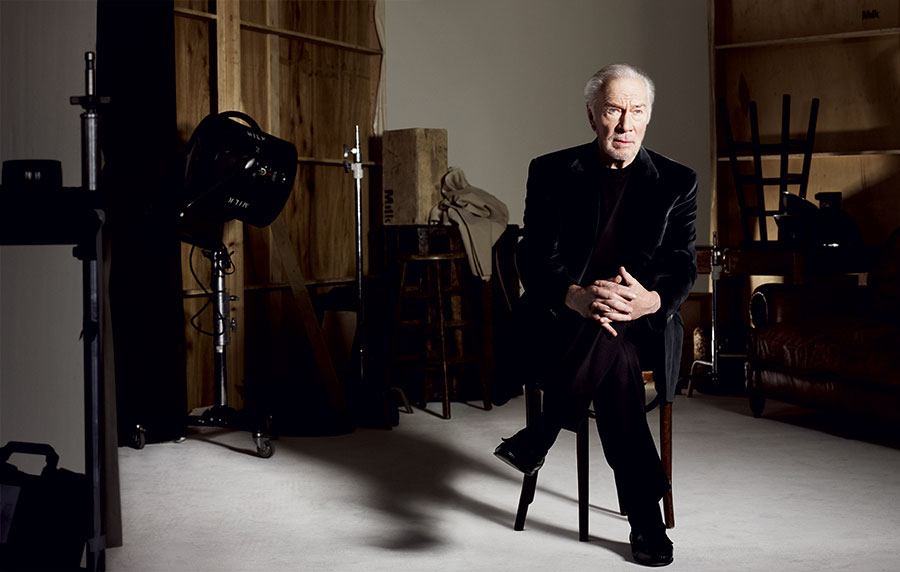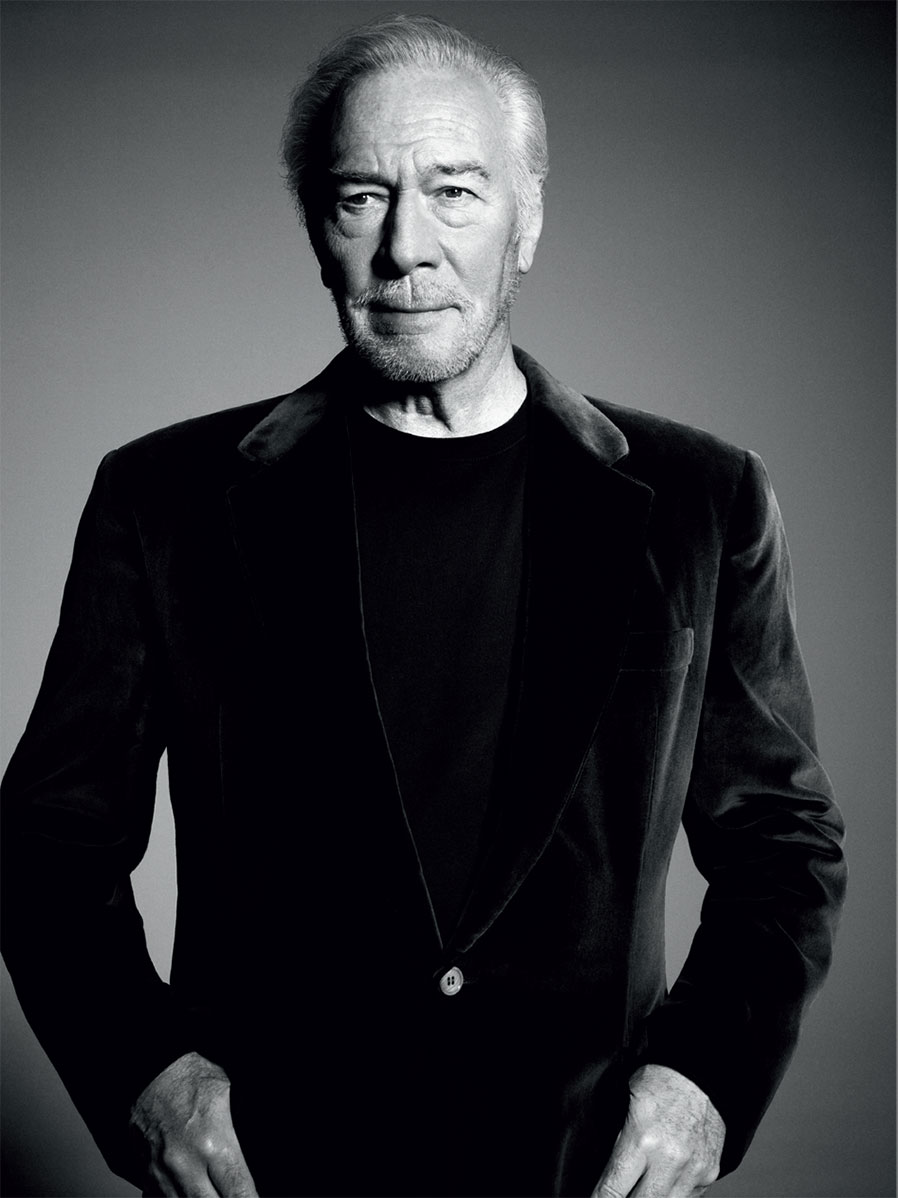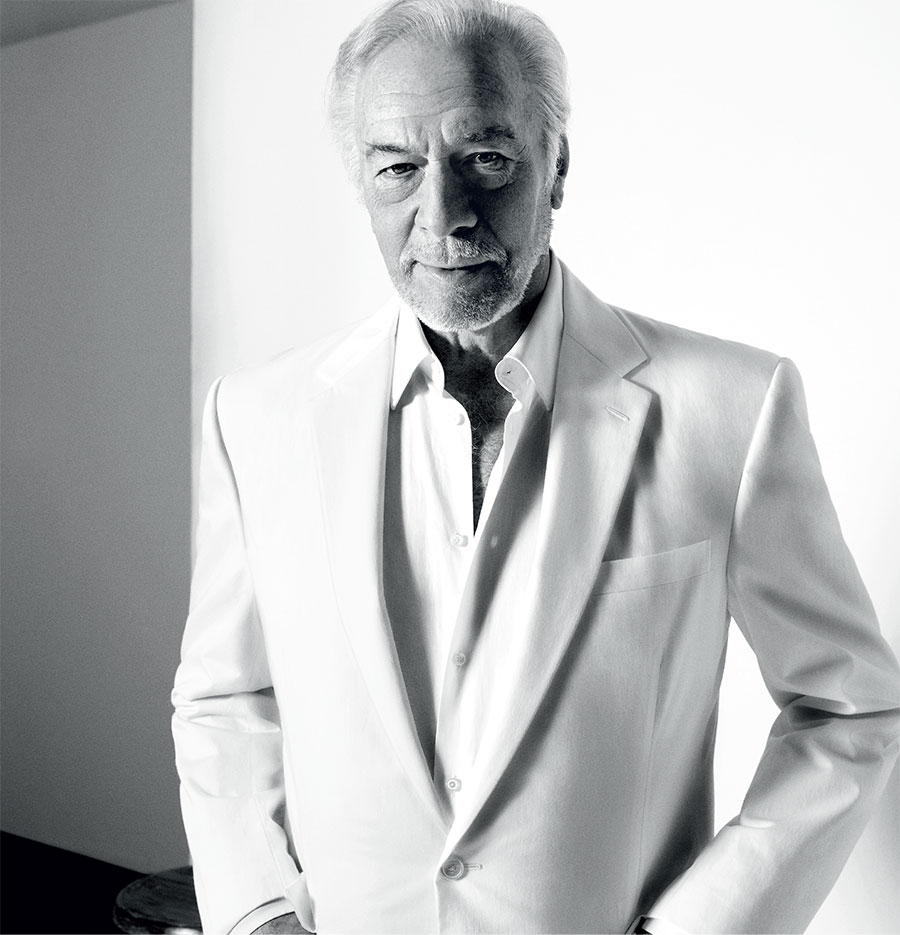Enter Stage Right: Christopher Plummer On the Physical Toll of His Theatre Work and How He Stays Stage-Ready

Photo: Bryan Adams
Cement floors are hell on the body. When the actor Christopher Plummer walks into the small lounge for our interview, he moves slowly, carefully. The leather club chairs are eschewed for a more upright, straight-backed one, and he gingerly lowers himself into it and smiles. “It’s my back,” he explains. “The stage here is cement, which is tough on actors. A lot of modern stages are padded.
Even wooden ones give but when they built this stage, cement was the thing.” No padding, no give, just plain hard.
First of all, “here” is Stratford, Ont., home of the Shakespeare Festival where Plummer is set to play Prospero in The Tempest. Secondly, it would be wildly inaccurate to imply that Plummer is frail or not up to the task of performing the two-and-a-half–hour play night after night for its lengthy run from June 11 to Sept. 12. Quite the opposite. But on this day, an hour before he will see the staff massage therapist (that cement stage takes its toll on actors of all ages), he is stiff and aching. But most of all, he is charming and sharp.
At 80 years of age, this star of stage and screen is in high demand, and for characters that don’t relegate him to elderly sages or grumpy old men. Indeed, his roles are as compelling and groundbreaking as any he played in his youth.
Wearing his signature scarf and sipping a cup of coffee, he is excited to be back here. In 2008, he starred in the production of Caesar and Cleopatra. In 2002, he headlined King Lear, eventually taking the production to New York’s legendary Lincoln Center. In fact, Plummer’s history with Stratford goes back to 1956 when he appeared in Henry V and he has performed at the venue off and on ever since.

Which brings up his decision to play Prospero at this point in his career. “It’s expected in a way. You know, toward the end of your life you’re going to play Prospero. Everybody thinks of it as a sort of farewell to the stage,” he admits. “Well, it’s not farewell as far as I’m concerned. I hope to keep working for the next 10 or 20 years.”
His autobiography, In Spite of Myself, was published two years ago to positive reviews — a response that thrilled Plummer. “It blew my mind,” he confesses modestly. “People thought it was a good history of the theatre as well. I never wanted it to be a ‘me, me, me’ book, which it wasn’t.” A portion of the Stratford chapters were excerpted in this magazine in 2008 and described quite a raucous place, brimming with booze, women and mad antics that belie the calm atmosphere of this bucolic town. One wonders if this mayhem still exists behind backstage doors.
“Everything’s changed like mad and, you know, that was close to the war ending, and everybody was celebrating. It was an extraordinary time,” he says with a wicked grin. “It was a great drinking time. How the hell we got through all of the wonderful work that was done, I don’t know how we did it. The ’60s were rather like a revival of the ’20s. No one was particularly sure of the future. And quite rightly because the future became a great deal duller, sadly, and more dangerous.”
Of course, a lot has happened since the ’60s and, indeed, in the two years since the publication of his memoir. In 1965, the enormous success of The Sound of Music catapulted Plummer to superstardom. Decades and many film, stage and television roles later, he made a small film, The Last Station, released in 2009, which brought him several award nominations, including his first-ever Academy Award nomination this year. He says it was nice to get the nomination but admits he was surprised it was for that film. “Although I thought the movie was a very good little movie, but it was a sort of gentle movie, except for a few theatrical flare-ups between Helen and myself, and I didn’t expect it.”

Helen, of course, is Oscar-winning, Dame and, at 64, frequent member of various world’s sexiest women lists, Helen Mirren. They’ve been friends for years but The Last Station was their first time working together. “I think that that’s the honour, you know, the five top performances and so on. To be among them is honour enough. Somebody’s got to win, but we can’t be compared to each other. The subject matter and the roles are so different. So I was thrilled.”
Thrill aside, once it became clear that his performance was gathering momentum, Plummer found himself in the throes of award season, posing on the red carpet and attending special luncheons and photo calls. “It’s a shame in a way that awards have to be taken so seriously and blown out of all proportion because, while it’s nice to receive them, particularly when it’s your own peers that are voting, it’s not what we are in it for,” he explains. “We’re here to do some extraordinary work, if we can, and one has spent one’s whole life doing that without any kind of Oscar nod. So, I just think that awards are just for business, really, they’re business awards.”
Plummer knows the business inside and out. He has spent his career moving shrewdly and seamlessly between film and stage roles. For an actor of his magnitude and gravitas, performing Shakespeare is a given, but I wonder how difficult it is to choose a screenplay that doesn’t come with the pedigree of The Tempest. “First of all, it has to have some quality. Or, if it doesn’t, it has to have money,” he grins boyishly. “So you’re either doing the money picture or you’re going to do the quality picture. And both are terrific because the money picture makes you able to afford to go back and do the theatre, and the quality picture keeps you in the minds of good filmmakers.”
As he speaks about his work, it becomes clear that to watch Plummer is to witness a man who has discovered the secret to longevity, albeit unintentionally. Yet, how he has lived his life reads like a to-do list for aging well. For one thing, there’s his decision to stay active. “I’ve done sports all my life. In fact, I’ve only just recently given up tennis because I thought I’d save my knees for the work,” he says. “I’ve enjoyed tennis since I was five years old and so I miss it dreadfully, but there’s always something happening to your body when you challenge it. And there’s no bigger challenge than doing these great Shakespearean roles. You always do little things to yourself, like I’ve done to my sacroiliac, which is always uncomfortable, even painful, but it goes away and it’s fine.”

He is not one to complain or coddle his injuries, telling me that, around 25 years ago, doctors told him he needed a knee replacement, but he just kept going and has been fine ever since. Which brings up his next point: actors are athletes, and this requires dedication to the physical self. “People think it’s all done with mirrors. We have to do some strangely difficult work,” he explains, adding that The Tempest requires cast members to fly through the air with the help of wires, and others need to call on their dance and acrobatic backgrounds. “You play a great play like The Tempest, it’s long — two-and- a-half hours. You’ve walked round and round. You’ve walked, oh God, several, several miles.” And all on that cement floor. Back pain aside, Plummer insists it is his work that has helped his endurance. “It does damage but it also keeps you young,” he explains. “Keeps you alive and your body in tune.”
And then there’s the mind. “[The theatre] is a great challenge for memory,” he says of its need for pages upon pages of memorization. “That’s the most important thing you have in life. This is a wonderful exercise to keep it alive.”
And having a wife, Elaine Taylor, whom he married in 1970, with a Cordon Bleu cooking background has its advantages. “Another thing that kept me going was a proper diet. It’s vitally important,” he says. “My wife has great instincts. She knows just what to put in.”
He is devoted to his wife. And family has come to play a more important part in his life than it had in his youth. Plummer has one daughter, Amanda, from his first marriage to actress Tammy Grimes. A Tony Award-winning stage actress, Amanda is widely remembered for her pivotal scene in Pulp Fiction as Honey Bunny, opposite Tim Roth. Plummer admits in his memoir that he had virtually no contact with her growing up, but their relationship has managed to survive. “My neglected daughter … whom I hardly knew except through her work, has become more of a friend now, and I think we feel much closer than we have in the past,” he writes.
He has also called retirement “death.” “I love working because it keeps you alive,” he says. “I can’t think of anything worse than retirement and I feel so sorry for people who retire at an early age. Their lives are over, they really are. All they do is play golf and watch television. Unless they have some extraordinary resources and they want to do a second career.”

Fortunately, Plummer’s chosen path allows him to constantly reinvent and challenge himself, staving off any feelings of boredom. “I always say that it’s sad that most people are not happy with what they’re doing, that they spend their lives and can’t wait to get out of their job and retire. I can’t wait for my next job in my profession.”
Up next for Plummer is a film role as a 70-year-old widower who comes out to his son, played by Ewan McGregor, after his wife dies. It is the first time Plummer has played a gay character. “I was thrilled to play it, and it was very well written.” It also marks the first time he performs a kissing scene with a man, the Croatian actor Goran Visnjic, who rose to fame as the resident heartthrob on ER after George Clooney departed.
If you read his autobiography, one thing is perfectly clear, Plummer has a way with the ladies, so kissing a man must have been, at the very least, unusual if not uncomfortable. He nods, admitting that both he and Visnjic, stood on set grunting about it.
“I’m not going to kiss, I’m not going to kiss and all that nonsense,” he laughs. “There were no naked love scenes but there’s great tension in it.” The film, Beginners, is based on a memoir and is still finding distribution. He is also in negotiations for two other films, but those remain under wraps. Plummer also admits to the possibility of taking The Tempest to New York as he did with Lear. In other words, he’s booked until 2012.

Since he seems busier than Betty White, I wonder what, if anything, he does in his remaining down time. It’s taken up with concerts and entertaining friends at his homes in Connecticut and Palm Beach, he says.
His other passion is travel. He has had the fortune of seeing many sights from the vantage point of a movie set, but there are a few places that remain uncharted by his eyes. “There are parts of Africa I’ve not seen yet. I’ve never been to India or Egypt and I’d love to go there,” he says and bemoans the lack of pleasure one derives from air travel these days with heightened security and lessened service. “The glamour of travel ended with the Concord.”
That may be true, but it’s crystal clear that when it comes to Christopher Plummer’s own brand of joie de vivre, there is, thankfully, no end in sight.
A version of this article appeared in the Summer 2010 issue.
RELATED:
Legendary Canadian Actor Christopher Plummer Honoured With New Canada Post Stamp
Christopher Plummer: Revisiting Our Interviews with The Canadian Legend of Stage and Screen
Ages & Icons Podcast with Donald Sutherland and Christopher Plummer